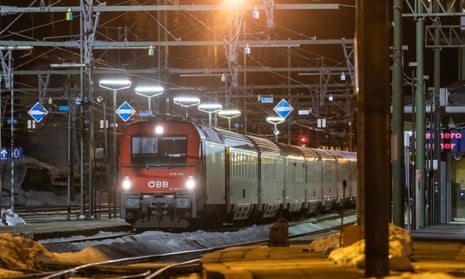Austria has said it will stop people suspected of carrying the coronavirus from crossing its border, after parts of northern Italy were put into lockdown over the weekend following a surge in cases.
The Austrian government released a travel warning for affected places in Lombardy and Veneto, following a meeting of the government’s coronavirus taskforce that included the chancellor, Sebastian Kurz.
“As far as the borders and cross-border traffic are concerned, we will proceed as follows: we will further tighten warning systems with our neighbours; [and] we will immediately order a stop in the event of suspected cases, as happened last night,” Kurz said on Monday.
Austria suspended train services to and from Italy for about four hours on Sunday evening to test two passengers for the coronavirus. The train, carrying about 300 passengers from Venice to Munich, was stopped on the Italian side of the Brenner pass before being allowed to continue its journey after the two passengers tested negative.
Government sources said this did not amount to a reintroduction of border controls inside the European Union’s passport-free Schengen zone. “There are no general border controls. Right now we don’t think that is the way forward,” an Austrian diplomat said. “If we do have a confirmed case, then we will check that again.”
Austrian travellers in affected parts of northern Italy are being advised to avoid crowds and follow instructions of local authorities.
Italian authorities have said they will impose fines on anyone entering or leaving restricted areas. By Monday, the number of cases of the virus in Italy had risen to 229 and six people had died.
Health ministers from Austria, France, Germany, Switzerland, Slovenia and Croatia are due to attend a meeting in Rome on Tuesday to discuss containing the virus. Italy’s government is urging its neighbours not to impose border controls, which it argues would be ineffective.
As Italy’s government scrambles to deal with the outbreak, which has led to police patrolling 11 towns and the cancellation of Venice carnival, the far-right former interior minister Matteo Salvini seized on the issue by making a link with migration.
“The government has underestimated the coronavirus,” he told a press conference in Genoa. “Allowing the migrants to land from Africa, where the presence of the virus was confirmed, is irresponsible.” Africa has so far had only one confirmed case of Covid-19, in Egypt.
The European commission announced on Monday it would send experts to Italy from the European Centre for Disease Prevention and Control, in a joint mission with the World Health Organization.
The EU executive also announced a €232m (£195m) package to deal with the virus, although some of the funds have yet to be signed off.
Earlier on Monday the commission said that any suspension of free movement within the 26-country EU free-travel zone should be based on a credible risk assessment and scientific evidence.
“We are facing … an unfolding situation, a complex situation and any decisions made need to be based on risk assessment and scientific advice, and need to be proportionate,” said Stella Kyriakides, EU commissioner for health and food safety. “We stress that for the moment WHO has not advised changing or imposing restrictions on either travel or trade.”
A commission spokesman said: “Right now, our advice does not include border controls.”
Governments in the passport-free Schengen zone can reintroduce border controls if there is “a serious threat to public policy or internal security”. European commission guidance states that controls at internal borders should remain an exceptional measure of last resort.
Border controls have been reintroduced and prolonged more than 50 times since September 2015, as governments have responded to large numbers of migrants and asylum seekers arriving in the EU, as well as terrorist threats.
France, Germany, Austria, Denmark, Sweden and Norway are among the countries that have notified Brussels of continuing border controls in response to terrorist threats. Both Spain and Poland enforced border controls when their countries were hosting UN climate talks, in 2019 and 2018 respectively.
Countries can impose border controls for up to six months for foreseeable events, such as international meetings or sporting championships, or for up to two years “in exceptional circumstances”.
At the height of the migration crisis in 2015, eight countries reintroduced border checks, prompting fears that the passport-free zone was on the brink of collapse.
EU officials stressed that the decision to reintroduce border controls lay in the hands of national governments. “It is important that member states fully respect the advice given from WHO and of course from ECDC, but such decisions concerning travel restrictions will always be member states’ competence and member states’ decisions,” Kyriakides said.
Nearly half the €232m EU aid package will go to WHO to boost preparedness in countries with poorer health systems. Smaller portions of money have been allocated to African health experts to ensure rapid diagnosis of the disease (€10m), as well as repatriation flights for EU citizens from Wuhan (€3m), the origin of the outbreak.
